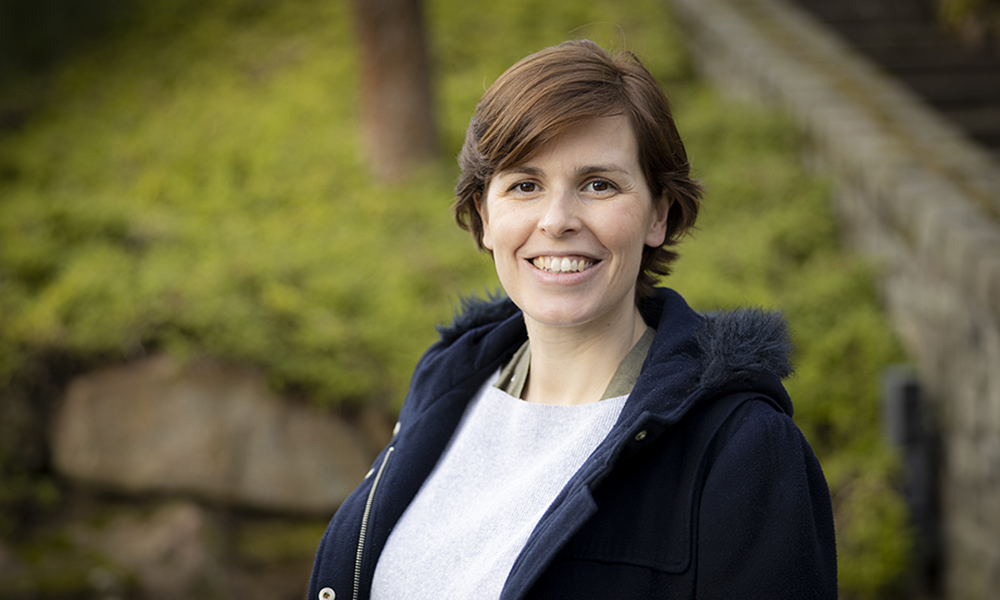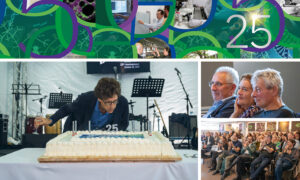
Science for all: the origins of Native Scientist
Joana Moscoso, co-founder and director of the non-profit organisation Native Scientist, visited EMBL on 21 February to present her work in a Science and Society seminar. Her talk was called ‘The pursuit of a dream: science for me and for all’.

Ocean breeze. Shining sun. Fragrant smells spilling from the family restaurant.
Joana Moscoso grew up in a peaceful village in the Portuguese countryside, away from the tumult of the city. Her parents were running their own restaurant: a place where locals and visitors mingled happily.
“At the age of nine, I heard about bacteria for the first time at school and I became fascinated with them. I knew from that moment that I wanted to become a scientist to study the organisms that we cannot see,” she explains. Her parents’ first reaction was rather discouraging. They simply could not understand why a nine-year-old girl would be interested in microbes. “Nobody in my family had a science-related job,” says Joana. “They couldn’t provide me with any guidance, but they ended up supporting me.”
To pursue her passion, Joana had to leave. After finishing high school, she moved to Porto, where she studied biology and met scientists for the first time – a life-changing experience. Her bachelor’s degree propelled her on to an international career. During her master’s studies in Australia, she specialised in microbiology, later moving to London where she began her PhD research on bacterial pathogens. She had come a long way to achieve her goal, and was about to become an expert in her field.

Yet something was missing from her daily lab life. She felt the urge to share her work with the community around her. During her time in London, she came up with an idea. “I didn’t want other kids to feel the lack of exposure to science – this barrier that I experienced as a child,” she says. “I started giving workshops in schools, so that kids would get to know what I care about the most: bacteria!”
The birth of Native Scientist
Native Scientist’s other co-founder, Tatiana Correia, then a postdoc in physics also working in London, was tutoring school children when she noticed a remarkable pattern: the children of migrant families struggled to keep up in maths and science; more so than non-migrant children.
“Most migrant kids face a challenge that other kids never do: dealing with two languages every day: their heritage language – the language spoken by their family – and their school language,” Joana explains. Their vocabulary is split between two environments, which may affect their school performance, especially in challenging subjects like science. As a result, when the school language becomes dominant in a pupil’s life, many migrant parents do not encourage their children to continue speaking their heritage language. For Joana, this is an unfortunate trend, given the professional, social, and cognitive benefits of multilingualism.
When Tatiana mentioned this issue to Joana, they started discussing potential solutions. Joana thought about her school workshops and the idea that would give rise to Native Scientist began to take root. They would continue organising science workshops in London schools, but specifically for migrant children, and in their heritage language.
Native Scientist was born. Since then, the organisation has grown and reaches more children every year, making them proud to talk and learn about science in their heritage language. The organisation is now giving volunteer-led workshops in eight countries and ten languages.
Making science available
Joana and Native Scientist volunteers all support Native Scientist’s core mission: to help people reach their full scientific potential, regardless of their cultural, linguistic, or socioeconomic background. To do so, it’s crucial that scientists engage in outreach activities.
Mariana Alves, EMBL PhD student and Project Manager for Native Scientist, brought the project to Heidelberg, where several EMBL scientists have participated in school workshops. She wants to encourage her colleagues to participate. “We’re funded by public money and we should share what we do with the public, as a way of giving back,” she says.
Organisations like Native Scientist target audiences that have few opportunities to come into contact with science. “I’d like science to be available to more people, not just privileged, English-speaking audiences,” says Rafael Galupa, EMBL postdoc and Editor for Native Scientist. “I wish my parents could understand DNA the way I understand DNA.” After years coordinating Native Scientist workshops in Paris, Rafael continues to volunteer in Heidelberg.
Volunteers will determine the future of Native Scientist. Joana hopes to see her project expand and reach more children in Europe and beyond. “Some researchers who engage with our workshops get creative and see the organisation as an incubator for spinoff projects. We never know what the future will bring – there’s so much potential!” she says.
After ten years of academic work, Joana has steered her career towards business development and career services, although she still devotes her time and energy to Native Scientist.
She is back in Portugal, exploring multiple ways to bridge the gap between science and society.
Ocean breeze. Shining sun. And the fragrant dream of the restaurant she wants to run, one day.
We need you!
Want to take part in Native Scientist workshops? Contact rafael.galupa@nativescientist.com for more information about Native Scientist or how to organise a workshop in your native language.
If you’re an EMBL scientist and would like to get involved in other outreach activities, contact Anne-Marie Alleaume, Outreach Assistant in the Communications department, at anne-marie.alleaume@embl.de.


